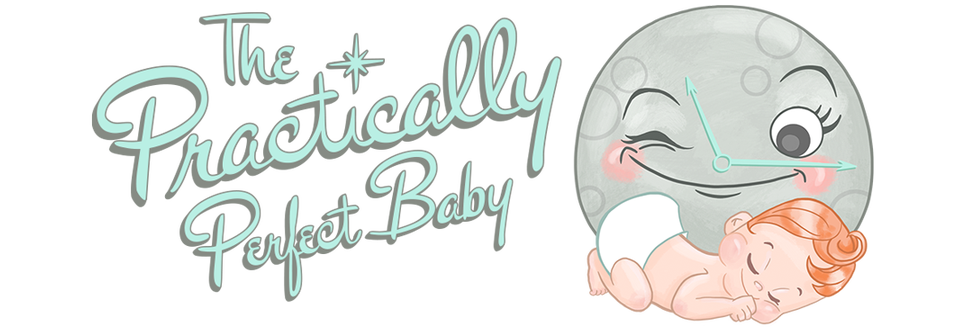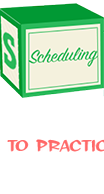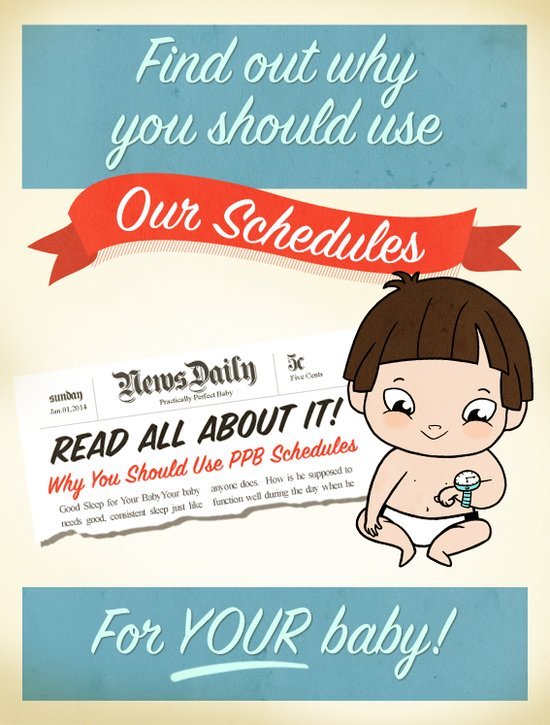Why You Should Use PPB Schedules
5 Reasons Why You Should Use PPB Schedules for Your Baby:
#1: Good Sleep for Your Baby
We didn’t invent the scheduling wheel here — we’ve modernized it to make it much more parent-friendly and comprehensive for you and your baby to use in today’s world. Why you should sleep-train your baby from night one has been researched and touted by several pediatricians and journals, and some are listed at the bottom of this post, for your edification.
We totally believe every baby needs good, consistent sleep, just like everyone else does. How is he supposed to function well during the day when he experiences erratic, unpredictable sleep at night? You don’t…do you? Putting your baby on a schedule right away is the key to creating a “rock star” sleeper and it’s entirely possible and totally beneficial for your baby. Think about this: pediatric nurses at the hospital put babies on a schedule, why wouldn’t parents continue this practice at home? And we’re not talking about letting your baby cry-it-out all night long or some rigid schedule that doesn’t allow for flexibility. There is nothing cruel, dangerous, or militant about sleep training starting on night one! And there’s no reason to wait to start. Your baby doesn’t need a fourth trimester…he joined this world ready to learn how to live and thrive in it! Showing you the techniques and products that will teach your baby how to sleep on his own and sleep well on an every nap/every night basis is one of Practically Perfect Baby’s most important missions. After all, we teach toddlers how to behave; we teach children how to read, why would we not teach our babies anything? During your baby’s first year, it is your job to teach your baby how to eat, play, nap, and sleep through the night because he won’t learn how to do any of these things well on his own (at least not for a year or two)! We’re talking about regulating your baby’s metabolism, setting his body clock, and creating his overall health and happiness. You can’t afford not to teach him! Your baby, even if he’s colicky, is completely capable of sleeping through the night at around eight weeks old, so why wouldn’t you want to help him achieve this? Nobody wants to be responsible for an overtired, cranky, sleep-deprived baby. You want to know what your baby needs and when. And because you are your baby’s first and most important teacher, we want to help you become an expert on fulfilling his needs.
#2: Good Sleep for You
Imagine not sleeping well for a year…or TWO!? Ask yourself: what kind of parent will lack of sleep turn you into? And how could you possibly be a good spouse; let alone a good friend, employee, boss, or sibling when you’re consistently getting bad sleep? How could it be in any way healthy for your body, soul, or mind? The truth is you can sleep well during the first year of your baby’s life and so can your partner. In fact, you could both even sleep better than before he arrived. Yes, you read that right…better (See our Monitor Post). The bottom-line: you want to be the best parent you can be and becoming sleep-deprived only hinders you (and your partner) from becoming one.
#3: Good for Your Marriage/Relationship
When you bring your baby home to live with you, he is joining your family, not taking it over and holding it hostage! The single best way to achieve a harmonious household and to maintain a joyful marriage is to put your baby in his crib, in his own nursery, and on a schedule starting on his first night at home. You’ll have a monitor and you’ll probably go blind from staring at it, but you absolutely do not want to have the baby physically sleep in your bed (remember, it’s the “marriage bed,” not the “family bed!”) or in your room. And no, it’s not necessary or more convenient if you’re breastfeeding to co-sleep! Set your alarm, get up, walk to the nursery, and feed your baby in there. Take turns with your partner feeding the baby during the first few weeks by using bottled breast milk that you pumped.
No matter what method you choose to feed your baby, it’s best to let one person sleep while the other is doing a feeding. And remember, if you’re using Practically Perfect Baby’s schedules, you’ll all be enjoying a longer night sleep-stretch as soon as four weeks. So, it’s up to the two of you to become a team and to support each other, during those first few crazy, beautiful weeks. Always remind each other that you’re working toward this lofty, but totally achievable goal: with our schedules, everyone will be sleeping through the night as soon as possible!
#4: Good Start
You have to think about what the ultimate goals for your baby are and start off trying to achieve them from the get-go. So, for example, if the ultimate goal is to have your baby eventually sleeping in his own room every night, why would you start off any differently? Do you want your toddler to go through the traumatic experience of being kicked out of the “family bed” after teaching him to need it? You have to teach your baby how to sleep independently, how and when to feed, how to self-soothe, and how to self-play right away because it won’t happen by accident. In other words, you have to show your baby how to become an independent member of the world outside of the womb as soon as they’re out of the womb!
You can’t create a confident, peaceful, playful, joyful baby with an inconsistent, unpredictable, and unreliable schedule. You may get lucky, but who wants to chance it? After all, this is all about your baby’s overall health and happiness and letting your brand new baby dictate when, where and how he will sleep, play, and eat is the fastest and surest way to create a cranky, confused, overtired, overly needy, and unhappy baby. We believe it is your job to direct, to teach, and to stabilize your baby’s world right from the start with a good, consistent, scheduled home-life.
#5: Good, Comprehensive Schedules
We think you’ll find our schedules to be simple, all-inclusive, and parent-friendly because we’ve taken out all of the guesswork! We’ve combined the exact feeding times, play times, and sleeping times with ounces of milk or formula because we think it’s way easier to be totally flexible if you first have an exact schedule spelled-out for you. You won’t see “Mid-Morning” or “Late Evening” on our schedules because we don’t want you to be pulling your hair out trying to do the math with a “baby brain!” And we’ve made all of our schedules printable, cute, colorful, and free for you! Plus, our scheduling logs are also printable, adorable, and completely useful so you can start tracking from night one.
Know that scheduling is in many ways the antithesis of attachment parenting, so it’s not going to be for everyone. But if you’re seeking an alternative to attachment parenting and think scheduling might be right for you and your family, we would be honored if you would give our schedules and tips a try! And when your baby’s sleeping through the night because of them, pay it forward and share it with a friend!
First print these:
Then choose the schedule to use according to your baby’s age in weeks:
Phase I
PPB Schedule: Birth-3 Weeks, PPB Schedule: 4-7 Weeks, PPB Schedule: 8-12 Weeks
Phase II
PPB Schedule: 13-16 Weeks, PPB Schedule: 17-26 Weeks
Phase III
PPB Schedule: 27-36 Weeks, PPB Schedule: 37-46 Weeks, PPB Schedule: 47-52 Weeks
Read up on these good resources on the benefits of scheduling and sleep-training your baby:
Moyer Slate Article, On Becoming Babywise, Jo Frost’s Confident Baby Care: What You Need to Know for the First Year from America’s Most Trusted Nanny, The Secrets of the Baby Whisperer, Bringing Up Bebe, The New Contented Little Baby, Dr. Spock’s Baby and Child Care, Healthy Sleep Habits, Happy Child, and www.babywisemom.com, Baby Sleep Training Methods Safe for Infants (Study)
Turns out parenting styles are based more on personal history, than on scientific research (“Time” Article). So don’t be scared or shamed into becoming the type of parent that doesn’t feel like the right fit for you and your family — whether it’s attachment parenting or scheduling your baby. We’re offering our schedules, advice, and tips for parents who’ve already chosen to schedule their babies to make it modern and more parent-friendly.
MISINFORMATION ALERT:
Heard that the American Academy of Pediatrics “issued a warning against Babywise?” THIS IS FALSE! Read up on the facts:
Robert Bucknam, M.D., FAAP Response to AAP “News”
Compare AAP and Babywise advice side-by-side for yourself!
Note: Our schedules are not meant to be rigid or inflexible — they’re meant to be spelled-out for you so that you can then make adjustments when necessary. Scheduling is only meant to be used with healthy babies. Always seek the advice of your pediatrician, physician, or other qualified health provider with any questions you may have regarding a medical condition and sleep training.














